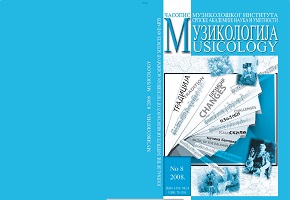Етномузиколошка биографија традиционалног народног музичара: биографија гуслара
Ethnomusicological Biography of the Traditional Folk Musician: Biography of the Gusle-player
Author(s): Danka Lajić-MihajlovićSubject(s): Customs / Folklore, Music, Cultural Anthropology / Ethnology, Sociology of Art, History of Art
Published by: Muzikološki institut SANU
Keywords: biography; folk musician; fiddler; epic; tradition;
Summary/Abstract: With the development of ethnomusicology from a comparative discipline to an anthropologically oriented science there has been an increase in the significance of the biography of folk musicians as scientific sources. The intention of the anthropological thought to accept and theoretically consider human nature as open and dynamic, has been realized in the ethnomusicological plane through the understanding of music as a product of thinking and behaviour of a particular musician in given circumstances. The concept of an artist is especially complex in the field of oral music culture, where creation and performance are connected in one person and the transferring process involves direct communication. The attempt to overcome the dichotomy of the musicological and sociological , i. e. anthropological attitude in ethnomusicology by synthesizing concepts which involve music, culture and man has brought particular importance to the relations between individual biographies and ”biographies of the collective“ – relevant historical, ethnological, anthropological, sociological, culturological, religion, ideological and other types of data. Observations enlightening the social side of the folk musician’s personality make the necessary “frame” for the biography: from ”objective“ social circumstances which modelled it to the opinion of the cultural environment about his performing. The folk musician’s biography oriented towards ethnomusicology involves the result of a critical evaluation of the picture based on the еmic and ethic vision: autobiographical data and the observations of others, primarily researchers. The complexity of a biographical discourse in ethnomusicology can be perfectly seen in the example of the gusle-player’s biography, as a genre-determined solo role in the tradition. For studying the relation between a person and a style of music expression, concerning gusle-players, it is important to bear in mind the change in the profile of gusle-players as performers: from poets-musicians in the period of exclusively oral communication, they become primarily musicians in the era of the appearance of printed collections of epic song collections. According to that, their musical talent, from the inherent “natural” predispositions to social circumstances affecting the development of the potential, becomes ever more important in the formation of an individual style and deserves the proportional attention in the biographies. For the music profile of the gusle-player there are other important their cognitive abilities and character features, as well as the social status, the level of education and so on. The examples of gusle-players Petar Perunović and Momčilo Lutovac illustrate the fact that the relations of music talents, intellectual abilities and the context – sociohistorical circumstances directing the formation of “music opinion and expression” – represent coordinates for ethnomusicology of functional biographies of folk musicians. In return, biographies of gusle-players are indispensable sources for studying the evolution, i. e. stratification of epic tradition.
Journal: Muzikologija
- Issue Year: 1/2008
- Issue No: 8
- Page Range: 225-240
- Page Count: 16
- Language: Serbian

